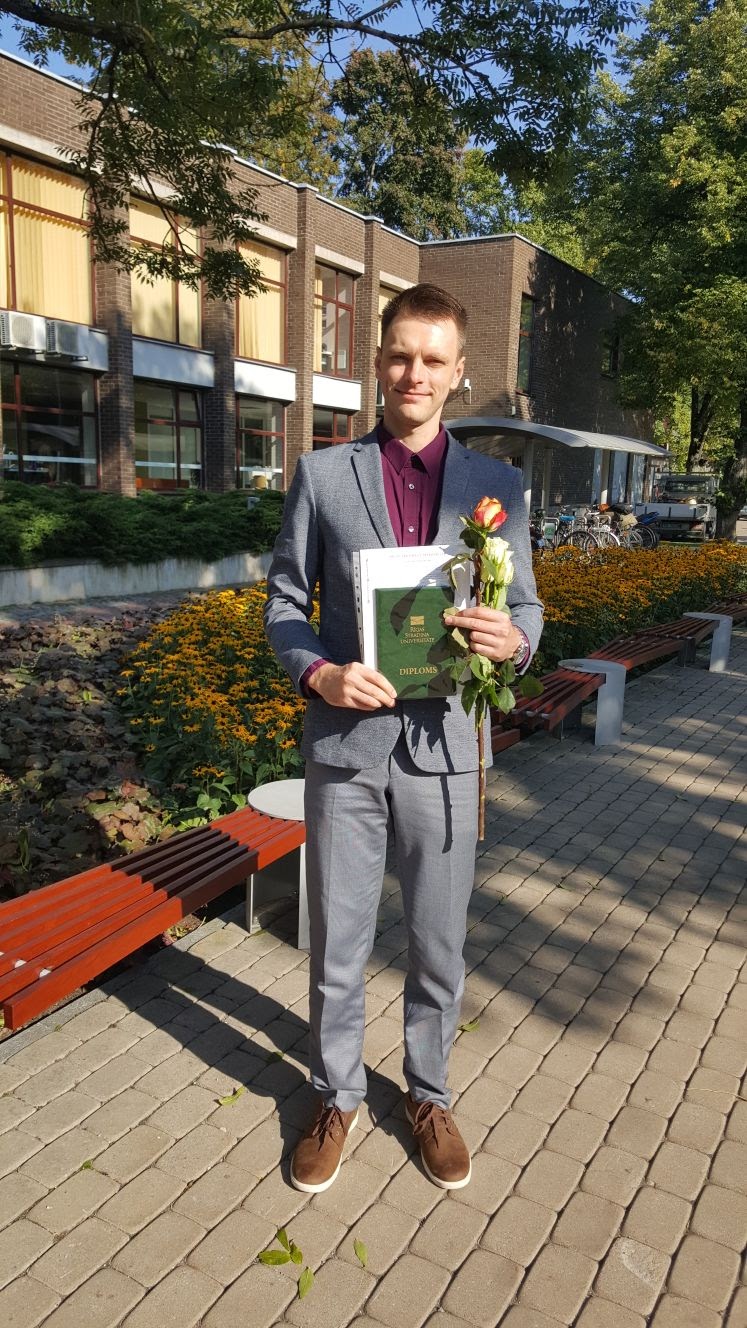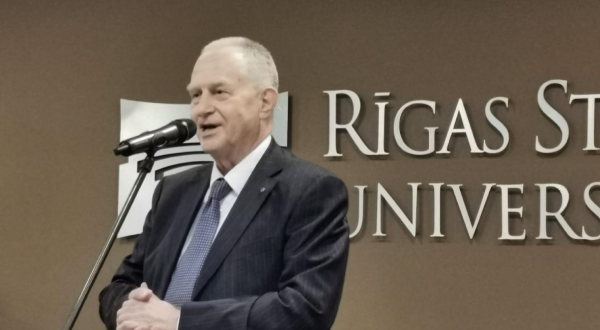Young psychiatrist Raivis Logins: the stigma of mental illness needs to be challenged
Psychiatrist Raivis Logins has just completed his second residency in narcology at Rīga Stradiņš University (RSU). ‘The residencies I did in psychiatry and narcology complement each other very well, because of the overlap between disorders and treatment options,’ says Logins who chose to do his residency at the Strenči Psychoneurological Hospital (Strenču psihoneiroloģiskā slimnīca). He is currently working there with both inpatient and outpatient treatments with a variety of patients – from 18-year-olds to elderly people.

His dual specialisation allows him to work out more targeted treatment options of patients with various types of psychiatric disorders and substance abuse disorders.
Why did you not stay in Riga after your studies as a large part of your peers did?
I have been working at the Strenči Hospital since 2015 as an on-duty apprentice doctor. The decision to work there was relatively easy to make, as I liked the positive and welcoming attitude of the head doctor and the hospital management. Of course, the geographical factor was also important. I am from Balvi, so I can now visit my family and relatives more often. I currently also work as an outpatient psychiatrist in the Balvi and Gulbene Hospital Association (Balvu un Gulbenes slimnīcu apvienībā).
What motivates residents to work outside of the big cities?
First of all, the fact that there are fewer residents in the countryside means that doctors have to take on more responsibilities much earlier in their professional careers. There is a lot of work, but it only adds to your experience. In regional hospitals, it takes less time for young doctors to become more independent in their decision-making, because there is not always an experienced colleague to ask for advice. There is a shortage of professionals in in all fields, not just in psychiatry, and regional hospitals are trying to retain, support, and motivate residents through various means.
Why did you choose psychiatry?
My mother is a physician, so I am familiar with this field. I became particularly interested in psychiatry during my fourth year of studies, when, during placements in various hospitals where I met real patients, I noticed that many disorders lack objective pathological findings. Patients were often theoretically alright except for a variety of subjectively unpleasant somatic symptoms. In such cases, it was often considered that everything was “in their head”. In my communication with patients, I have noticed that specific, supportive phrases can have a certain therapeutic effect if spoken at the right time. Of course, patients should not be encouraged to put all the responsibility for their self-esteem on a doctor’s shoulders and become dependent on their doctor.
During my studies, I worked at the National Burn Centre (Valsts Apdegumu centrs) for three years as a nursing assistant, or orderly. There I had my first experience with psychiatry, because the patients were often consulted by Lūcija Arāja, Head Physician of the Riga Psychiatry and Narcology Centre (Rīgas psihiatrijas un narkoloģijas centrs). During the final years of my studies, I did research on depression levels and self-esteem in patients with burn injuries. I quickly realised that psychiatry was more than just a bad mood or hallucinations. Psychiatric problems can often not be attributed to one specific cause, but are a multifactoral disorder or disorders of uncertain origin, which forces one to seek answers in other medical fields and broaden ones horizons. A psychiatrist must also be knowledgeable in neurology, cardiology, and endocrinology, for example. Often a psychiatrist has to work as an investigator talking to relatives to gather information that is as objective as possible and find out the history of a patient's condition. I need to understand a patient in order to treat them adequately.
I see that the stigmatisation of psychiatry and psychiatrists is still prevalent. People avoid going to a psychiatrist, because they are ashamed and afraid to admit that they need help.
I have worked in a hospital with severely ill patients as well as in an outpatient setting. I enjoy outpatient work for many reasons. This requires organisation as there is limited time to observe patients and to select appropriate treatments. A large part of patients have jobs and it is important to not only improve their psycho-emotional state, but to also maintain their quality of life. I try to reduce the stereotypes and prejudices against mental illness through my attitude.
Why did you choose to do your second residency in narcology?
Psychiatry and narcology are complementary specialties, as patients often have a dual diagnosis of substance abuse disorder and depression or schizophrenia.
Unfortunately, there has been a recent upward trend in drug use, and they are not always hard drugs – marijuana use is also increasing. I have experienced how drug use can lead to irreversible psychological problems. A person actually does not return to normal life and can, in their early adulthood, become incapacitated for the rest of their lives.
I strongly disagree with the idea of legalising marijuana and other soft drugs, because the consequences of using them are unpredictable and often far more serious than those of using alcohol or cigarettes, for example. How can you combat the stereotype that marijuana is a soft drug and does not do much harm? I think that we need to continue educating the public, and especially young people, to explain and show the consequences of drug use.
Psychiatry is a complex specialty that requires great emotional resources. How can you maintain your love for humanity while working in this profession?
The ability to maintain my dignity and have constructive relationships with patients saves me from burning out. There shouldn’t be a relationship model in medicine where the patient is perceived as a customer (consumer) and where the customer is always right. Psychiatry is a field where one has to look into the human soul, so there must be a reciprocal and respectful attitude between a doctor and a patient. Patients often come with pre-conceived diagnoses and ideas about what drugs they need from what they’ve read online – we call it “cyberchondria”. It is difficult to work with patients like this and it takes time and resources to reach an agreement on a treatment plan. I believe that a doctor should be an authority in the eyes of their patients.
Psychiatry as a field has not been particularly encouraged up till now. What is the situation currently?
To describe the current situation in psychiatry, we doctors usually say that the dynamics are improving, but that does not mean that the situation is perfect. As new therapeutic approaches have appeared, psychiatry continues to evolve, develop, and modernise. Attitudes and communication with patients and the public have also changed in a positive direction. Something I would like to bring back? The first thing I can mention is the two-month vacation. I must admit that the work is hard. It is emotionally and physically draining, and it requires adequate rest and time off work.
We have gradually introduced modern electroconvulsive therapy at the Strenči Psychoneurological Hospital. This method has been the subject of new research and can be successfully used not only for the treatment of chronic, treatment-resistant psychiatric disorders, but also, for example, as an alternative treatment for epilepsy. This has been successfully carried out by colleagues from Estonia and Scandinavia. It is practically free of complications and side effects and also less painful for the patient due to short-acting general anaesthesia. This method can definitely serve as a good and effective alternative to some medications in the future.
Most psychological problems have to be dealt with in a complex way in combination with psychotherapy, which in Latvia is not subsidised by the state. Patients have to pay for it themselves, unlike psychiatrists whom patients can access directly, excluding the private sector.
Recently, we have increasingly been working with rehabilitation specialists (physiotherapists, occupational therapists, art therapists) to facilitate psychiatrists’ work and provide additional opportunities to help patients on a larger scale.
What are the qualities a good psychiatrist should posess?
Patience, self-respect, and self-confidence in what you do. You must also be aware of the limits of your competences. We need to make the process of helping a person more specific, personal, and thus more effective.
As a psychiatrist, I have been inspired by the saying: ‘A young, smart doctor can cure one disease with twenty drugs, while an experienced one can cure twenty diseases with one drug.’ I would, therefore, like to call on my colleagues to cooperate, to communicate more with one another, and to share good advice.
Related news
 Medicine as the art of mindset and presence: Professor Romans Lācis on the importance of patient dialogueAnniversaries, Interviews
Medicine as the art of mindset and presence: Professor Romans Lācis on the importance of patient dialogueAnniversaries, Interviews


